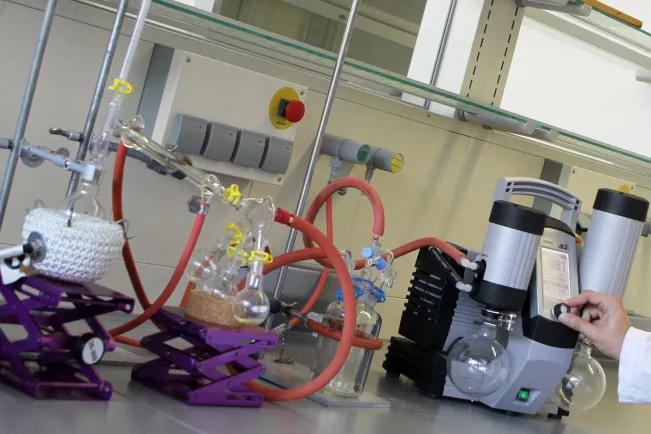Fachbereich Angewandte Naturwissenschaften
Fundamentals of Organic Chemistry and Biochemistry

Vorlesung
Compulsory course in the 3rd semester of the BSc programme
in Forensic Sciences
The course consists of a lecture, an accompanying tutorial (exercises)
and a laboratory course (including experiments).
Lecture: 3 lesson hours per week
Tutorial: 2 lesson hours per week;
Laboratory course: 1 lesson hour per week;
___________________________________________
- Fundamental principles of organic chemistry (such as theory of chemical bonds and molecular structure),
- Introduction into important classes of organic substances (including essential classes of biomolecules) with a special focus on their physical and chemical properties (such as volatility, polarity, solubility, acidity / basicity).
- Presentation of typical chemic
- al reactions of organic compounds including reaction mechanisms,
- Influences of stereochemical aspects on the molecular structure as well as the physical and chemical properties of organic substances.
- Comparison of chemical and biochemical reaction pathways for selected reactions (such as oxidations and acetylations)
Übung
- Fundamental principles of organic chemistry (such as theory of chemical bonds and molecular structure),
- Introduction into important classes of organic substances (including essential classes of biomolecules) with a special focus on their physical and chemical properties (such as volatility, polarity, solubility, acidity / basicity).
- Presentation of typical chemic
- al reactions of organic compounds including reaction mechanisms,
- Influences of stereochemical aspects on the molecular structure as well as the physical and chemical properties of organic substances.
- Comparison of chemical and biochemical reaction pathways for selected reactions (such as oxidations and acetylations)
Praktikum
- Basic techniques of organic synthesis (such as heating under reflux, recrystallization, liquid-liquid extraction),
- Basic techniques of analytical organic chemistry (such as determination of melting points and optical purities)
Teilnahmevoraussetzungen
For the participation in lectures or exercises: there are no entry requirements;
for the participation in practical class: successful attendance to the General Safety Instructions and Specific Laboratory Safety Instruction is mandatory.
_______________________________
Modular examination - graded
Written final examination: 90 %
Laboratory course (oral examination and lab report): 10 %
Written examination and laboratory course must be passed independently.
Literatur
1. K.P.C. Vollhardt, N.E. Schore, Organische Chemie, Wiley-VCH, 4th Edition, 2005.
2. P.Y. Bruice, Organische Chemie, Pearson Prentice Hall, 5th Edition., 2007.
3. J. McMurry, Fundamentals of Organic Chemistry, Brooks / Cole Cengage Learning, 2011.
4. R. H. Garrett, C. M. Grisham, Biochemistry, Brooks / Cole Cengage Leatning, 2011.
5. H.P. Latscha, H.A. Klein, Organische Chemie, Springer-Verlag, 5th Edition, 2002.
6. U. Lüning, Organische Reaktionen, Spektrum Akad. Verlag, 2nd Edition, 2007.
7. R. Brückner, Reaktionsmechanismen, Spektrum Verlag, 3rd Edition, 2004.
8. H.G.O. Becker et al., Organikum, Wiley-VCH, 22nd Edition, 2004.
Sie haben noch Fragen?

Margit Schulze
Professorin für Industrielle Organische Chemie und Polymerchemie
Forschungsfelder
Standort
Rheinbach
Adresse
von-Liebig-Str. 20
53359, Rheinbach
Telefon
+49 2241 865 566

Links
Weiterführende Links